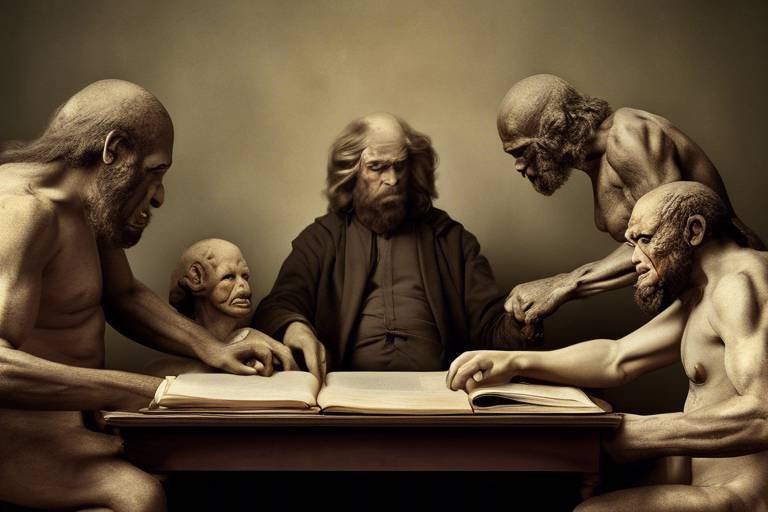The Influence of Kantian Philosophy on Today's World
Immanuel Kant, a towering figure in Western philosophy, has left an indelible mark on various facets of contemporary thought. His ideas, particularly those surrounding ethics, politics, and science, continue to resonate in today’s society. You might wonder, how can the musings of an 18th-century thinker still hold relevance in our fast-paced, modern world? The answer lies in the profound depth and universal applicability of his concepts. Kant's philosophy invites us to question our moral frameworks, understand the essence of duty, and appreciate the significance of autonomy, making it a vital part of our intellectual heritage.
In a world increasingly defined by rapid change and ethical dilemmas, Kant's principles provide a sturdy compass for navigating the murky waters of morality. His emphasis on duty and the categorical imperative challenges us to think beyond mere consequences. Instead of asking, "What will happen if I do this?" we are encouraged to consider, "Is this action right in itself?" This shift in perspective is not just academic; it has real-world implications for how we approach issues from personal relationships to global conflicts.
Moreover, Kant's ideas about autonomy and individual rights have become cornerstones of modern democratic thought. They encourage us to view each person as an end in themselves, deserving of respect and dignity. This notion has fueled movements for social justice and equality, reminding us that our actions should uplift rather than diminish the rights of others. As we delve deeper into Kantian philosophy, we uncover layers of insight that challenge us to engage with the world more thoughtfully and responsibly.
In this article, we will explore the foundations of Kant's philosophy, its impact on modern ethics, and how his ideas continue to shape political theory and international relations. Buckle up as we embark on a journey through the intricate web of Kantian thought and its relevance to our contemporary lives!
Understanding the core principles of Kant's philosophy is essential for grasping their impact on today's ethical frameworks. At the heart of Kant's thought is the idea of the categorical imperative, a moral law that applies universally to all rational beings. This principle is not merely theoretical; it serves as a practical guide for ethical decision-making. Kant argues that we should act only according to maxims that we can will to become universal laws. This means that our actions should be guided by principles that we would want everyone to follow, fostering a sense of moral community.
Another crucial aspect of Kant's philosophy is the concept of autonomy. For Kant, true moral agency arises from the ability to govern oneself according to reason. This notion of autonomy has profound implications for how we understand personal freedom and responsibility in modern society. It underscores the importance of individual rights and the necessity of treating others as ends in themselves, rather than as means to an end.
Kant's moral philosophy has significantly influenced contemporary ethical theories, particularly deontological ethics. This branch of ethics emphasizes the importance of duty and intention in moral decision-making. Unlike utilitarianism, which focuses on the outcomes of actions, Kantian ethics insists that the morality of an action is determined by the intention behind it. This distinction is crucial in various fields, including law, medicine, and business, where ethical dilemmas often arise.
Examining the contrasts between Kantian ethics and utilitarianism reveals deep philosophical divides regarding the nature of morality and the role of consequences in ethical considerations. While utilitarianism advocates for the greatest good for the greatest number, Kantian ethics challenges us to consider the rights and dignity of individuals, regardless of the potential outcomes. This clash of perspectives prompts us to reflect on our moral priorities and the ethical frameworks we choose to adopt.
The categorical imperative serves as a foundational concept in Kant's moral philosophy, guiding individuals to act according to universalizable maxims that respect the autonomy of all rational beings. It compels us to ask whether our actions could be consistently applied as a universal law. This principle not only promotes ethical behavior but also fosters a sense of community and mutual respect among individuals.
Kant's emphasis on duty over consequences challenges contemporary ethical discussions, prompting debates on moral absolutism versus relativism in various fields, including law and politics. By prioritizing duty, Kant invites us to consider the moral implications of our actions, regardless of their outcomes. This perspective is particularly relevant in today’s world, where ethical dilemmas often involve complex trade-offs and competing interests.
Kant's notion of autonomy is pivotal in understanding individual rights and responsibilities. It influences modern discussions on personal freedom, social justice, and moral agency. By advocating for the inherent worth of each individual, Kantian philosophy provides a framework for addressing issues of inequality and injustice. It challenges us to recognize our moral obligations to one another and to strive for a society that honors the dignity of all its members.
Kant's ideas about democracy, human rights, and the social contract have profoundly shaped modern political thought. He envisioned a world where individuals could participate in governance, promoting concepts of justice and equality. This vision is reflected in contemporary democratic practices, where the emphasis on individual rights and collective decision-making remains central.
Kant's vision of perpetual peace and cooperation among nations continues to inform contemporary international relations. His advocacy for diplomacy, human rights, and global governance resonates in today's political landscape, where the challenges of globalization demand collaborative solutions. By emphasizing the importance of mutual respect and understanding, Kantian philosophy encourages nations to work together in pursuit of common goals.
Kant's advocacy for reason and enlightenment encourages critical thinking and challenges dogma. This spirit of inquiry fosters a culture of questioning that remains relevant in today's society. As we navigate complex issues, from climate change to technological advancements, Kant's call for rational discourse and ethical reflection serves as a guiding principle for fostering progress and understanding.
- What is the categorical imperative? The categorical imperative is a fundamental principle in Kant's moral philosophy that states one should act only according to maxims that can be universally applied.
- How does Kantian ethics differ from utilitarianism? Kantian ethics focuses on the intention behind actions and moral duties, while utilitarianism emphasizes the outcomes and consequences of actions.
- Why is autonomy important in Kant's philosophy? Autonomy is crucial because it underscores the value of individual rights and moral agency, allowing people to govern themselves according to reason.

The Foundations of Kantian Philosophy
Understanding the core principles of Kant's philosophy is like unlocking a treasure chest of ideas that have shaped our modern ethical landscape. At the heart of Kantian thought lies the concept of duty, which Kant believed was fundamental to moral decision-making. Unlike many philosophical traditions that focus on the outcomes of actions, Kant emphasized the importance of the intention behind those actions. This distinction is crucial; it invites us to reflect on our motivations and the inherent responsibilities we carry as moral agents.
One of the cornerstones of Kant's moral philosophy is the categorical imperative. This principle serves as a universal guideline for evaluating our actions. Kant proposed that we should act only according to that maxim whereby we can, at the same time, will that it should become a universal law. In simpler terms, before you act, ask yourself: "What if everyone did this?" If the answer leads to a contradiction or a world you wouldn’t want to live in, then you should reconsider your action. This powerful idea not only shapes personal ethics but also has implications for societal norms and laws.
Another essential aspect of Kant's philosophy is the concept of autonomy. For Kant, autonomy is not merely about freedom; it is about the ability to govern oneself according to rational principles. This idea profoundly influences contemporary discussions on individual rights and responsibilities. It challenges us to recognize that with freedom comes the duty to act in ways that respect the autonomy of others. In a world where personal freedom often clashes with social responsibility, Kant's emphasis on autonomy remains a guiding light, encouraging us to find a balance between our desires and our duties to others.
To summarize, the foundations of Kantian philosophy can be encapsulated in three main ideas:
- Duty: The moral obligation to act rightly, regardless of the consequences.
- Categorical Imperative: A universal principle guiding moral actions based on rationality.
- Autonomy: The capacity to make rational decisions that respect the freedom of others.
These foundational concepts not only provide a framework for understanding morality but also encourage us to engage in profound self-reflection. In a world that often prioritizes outcomes over intentions, Kant's philosophy serves as a reminder that our moral compass should be guided by duty and respect for others. As we navigate the complexities of modern life, embracing these principles can lead to a more ethical and just society.

Kant's Impact on Modern Ethics
Kant's moral philosophy has left an indelible mark on the landscape of contemporary ethics, reshaping how we think about right and wrong. His emphasis on duty and intention stands in stark contrast to other ethical theories, particularly utilitarianism, which often prioritizes outcomes over the moral quality of actions. Imagine you're faced with a decision: should you help a friend in need or stay out of it because it might inconvenience you? Kant would argue that your moral duty to help your friend is paramount, regardless of the consequences. This notion of duty is not just a guideline; it serves as a compass for ethical behavior in our everyday lives.
At the core of Kant's ethical framework is the concept of the categorical imperative, which asserts that one should act only according to that maxim which one can will to become a universal law. This principle encourages individuals to consider the broader implications of their actions. For instance, if everyone lied, trust would erode, and society would crumble. Thus, lying is inherently wrong, regardless of the situation. Kant's perspective compels us to think beyond personal gain and consider the impact of our decisions on others, fostering a sense of moral responsibility that resonates deeply in today's ethical discussions.
Moreover, Kant's ideas have paved the way for modern deontological ethics, a framework that emphasizes the importance of following moral rules and principles. This has influenced various fields, including law, medicine, and business ethics. In legal contexts, for example, the idea that certain actions are inherently right or wrong has led to the establishment of laws that protect individual rights, irrespective of the potential benefits of violating them. Kant's insistence on the moral worth of actions based on intent has also guided ethical practices in healthcare, where patient autonomy and informed consent are paramount.
However, Kant's approach does not come without its criticisms. Some argue that strict adherence to duty can lead to morally questionable outcomes. For example, if telling the truth puts someone in danger, should one still adhere to the principle of honesty? This debate highlights the tension between Kantian ethics and consequentialist theories, prompting ongoing discussions about the nature of morality in a complex world.
In conclusion, Kant's impact on modern ethics is profound and multifaceted. His focus on duty, intention, and the categorical imperative continues to challenge and inspire ethical thought. As we navigate the complexities of moral decision-making in contemporary society, Kant's principles serve as a vital reference point, urging us to consider not just what we do, but the reasons behind our actions and their broader implications.
- What is the categorical imperative? The categorical imperative is a central concept in Kant's moral philosophy, which states that one should only act according to maxims that can be universally applied.
- How does Kantian ethics differ from utilitarianism? Kantian ethics focuses on the morality of actions based on duty and intention, while utilitarianism evaluates actions based on their consequences and overall happiness.
- Why is duty important in Kant's philosophy? Duty is crucial because it emphasizes that moral actions must be performed out of respect for moral law, rather than for personal gain or consequences.
- Can Kantian ethics be applied in modern situations? Yes, Kantian ethics can be applied to contemporary issues such as healthcare, law, and business ethics, guiding decision-making based on moral principles.

Kant and Utilitarianism
When diving into the depths of ethical philosophy, one cannot overlook the stark contrast between Kantian ethics and utilitarianism. At first glance, both frameworks aim to guide moral behavior, but they do so through fundamentally different lenses. While Kant emphasizes the importance of duty and intention, utilitarianism focuses on the consequences of actions. This divergence raises intriguing questions: What truly defines morality? Is it the intention behind an action, or is it the outcome that matters most?
Kant's philosophy is rooted in the idea that moral actions must stem from a sense of duty, governed by the categorical imperative. This principle posits that one should act only according to maxims that can be universally applied. In simpler terms, if you wouldn't want everyone to act a certain way, then you shouldn't act that way yourself. This is a powerful call for moral consistency, pushing individuals to think beyond their immediate desires and consider the broader implications of their actions.
On the other hand, utilitarianism, championed by thinkers like Jeremy Bentham and John Stuart Mill, argues that the rightness or wrongness of an action is determined by its ability to produce the greatest good for the greatest number. This consequentialist approach often leads to a more flexible moral framework, where the ends can justify the means. For instance, a utilitarian might argue that sacrificing one life to save many is a morally acceptable choice, whereas Kant would vehemently oppose such reasoning, insisting that every individual has inherent worth and should never be used merely as a means to an end.
This philosophical clash has significant implications in real-world scenarios. Consider a situation where a government must decide whether to implement a policy that benefits the majority but marginalizes a minority group. A utilitarian perspective may advocate for the policy, arguing that the overall happiness it creates outweighs the suffering of the few. In contrast, a Kantian approach would challenge this decision, emphasizing the duty to respect the rights and dignity of every individual, regardless of the potential benefits to the majority.
Ultimately, the debate between Kantian ethics and utilitarianism invites us to reflect on our own moral compass. Are we more inclined to consider the intentions behind our actions, or do we prioritize the outcomes? This question not only shapes our personal ethics but also influences broader societal norms and policies. As we navigate complex moral landscapes, understanding these philosophical underpinnings can empower us to make more informed and principled choices.
- What is the main difference between Kantian ethics and utilitarianism? Kantian ethics focuses on the intention behind actions and adherence to duty, while utilitarianism emphasizes the consequences of actions and seeks to maximize overall happiness.
- Can Kantian ethics and utilitarianism coexist? While they are fundamentally different, some argue that elements from both can be integrated to create a more comprehensive ethical framework.
- How does Kant's categorical imperative apply to modern ethical dilemmas? The categorical imperative encourages individuals to consider whether their actions could be universalized, promoting a sense of moral responsibility and respect for others.

The Categorical Imperative Explained
The categorical imperative is one of the most significant contributions of Immanuel Kant to moral philosophy. Unlike hypothetical imperatives, which are conditional and depend on personal desires or goals, the categorical imperative serves as an unconditional moral law that applies to all rational beings, regardless of their individual circumstances. At its core, it demands that we act only according to that maxim whereby we can, at the same time, will that it should become a universal law. This principle encourages a sense of moral duty that transcends personal inclinations.
To better understand the categorical imperative, consider its three formulations:
- The Formula of Universal Law: Act only according to that maxim by which you can at the same time will that it should become a universal law.
- The Formula of Humanity: Act in such a way that you treat humanity, whether in your own person or in the person of any other, always at the same time as an end and never merely as a means to an end.
- The Formula of Autonomy: Act only so that your will can regard itself at the same time as making universal law through its maxims.
These formulations emphasize the importance of rationality, respect for individuals, and the universality of moral laws. By adhering to these principles, individuals can navigate complex moral dilemmas with clarity and purpose. For instance, when faced with a decision that may harm another person, the categorical imperative urges us to consider whether our action could be justified as a universal law. Would it be acceptable for everyone to act in the same way? If the answer is no, then the action is deemed immoral.
Moreover, the categorical imperative challenges us to recognize the inherent dignity of every person. When we treat others merely as a means to our own ends, we undermine their worth and autonomy. This perspective is particularly relevant in today’s world, where ethical considerations in business, politics, and personal relationships often come into conflict with self-interest. Kant's philosophy compels us to prioritize ethical integrity over personal gain, fostering a more just and equitable society.
In summary, the categorical imperative is not just a theoretical concept; it serves as a practical guide for ethical decision-making. By embracing its principles, we can cultivate a more compassionate and responsible approach to our actions, ensuring that we contribute positively to the world around us. As we navigate the complexities of modern life, the insights offered by Kantian philosophy remain profoundly relevant, urging us to reflect on our duties and the moral implications of our choices.
- What is the categorical imperative? The categorical imperative is a foundational principle of Kant's moral philosophy that dictates that one should act only according to maxims that can be universalized.
- How does the categorical imperative differ from hypothetical imperatives? Hypothetical imperatives are conditional and depend on personal desires, while categorical imperatives are unconditional and apply universally to all rational beings.
- Why is the categorical imperative important today? It encourages ethical decision-making that respects the dignity of all individuals, fostering a more just and equitable society.

Duty vs. Consequence
When we dive into the heart of Kantian philosophy, one of the most intriguing debates emerges: . Kant firmly believed that morality is rooted in duty rather than the outcomes of our actions. This perspective challenges the more popular utilitarian view, which prioritizes the results of actions over the intentions behind them. Imagine you're at a crossroads: one path leads to an action that produces the greatest happiness for the most people, while the other path aligns with your moral duty, even if it might not yield the best results. This dilemma encapsulates the essence of Kant's ethical framework.
Kant's categorical imperative posits that we should act according to maxims that we would want to become universal laws. In simpler terms, if you wouldn't want everyone to act in a certain way, then you shouldn't act that way yourself. This principle underscores the importance of intention and moral obligation. For instance, consider a scenario where telling a lie could save a life. A utilitarian might argue that the lie is justified because it leads to a better outcome. However, Kant would argue that lying is inherently wrong, regardless of the consequences, because it violates the duty to be truthful.
This fundamental divide between duty and consequence raises profound questions in various fields, especially in law and politics. In legal contexts, should a judge prioritize the intention behind a crime or the consequences of the criminal's actions? Similarly, in political discussions, should policies be evaluated based on their outcomes or the ethical obligations of those who create and enforce them? These questions highlight the ongoing relevance of Kant’s philosophy in contemporary debates.
Moreover, Kant's emphasis on duty fosters a sense of moral absolutism, suggesting that certain actions are categorically right or wrong, regardless of context. This contrasts sharply with moral relativism, which argues that ethical standards can vary based on circumstances. The tension between these two perspectives often leads to heated discussions among ethicists, policymakers, and everyday individuals trying to navigate complex moral landscapes.
In conclusion, the dichotomy of duty versus consequence invites us to reflect on our own ethical beliefs. Are we more inclined to judge actions based on their outcomes, or do we hold steadfast to our principles, even when the results may not be favorable? Engaging with Kant's philosophy encourages us to consider the weight of our decisions and the moral frameworks that guide us in a world where ethical dilemmas are ever-present.
- What is the main difference between Kantian ethics and utilitarianism?
Kantian ethics focuses on the morality of actions based on duty and intention, while utilitarianism prioritizes the outcomes and consequences of actions. - How does the categorical imperative apply to everyday decisions?
The categorical imperative suggests that we should act according to principles that could be universally applied, ensuring our actions respect the autonomy of others. - Can duty and consequence coexist in ethical decision-making?
While they represent different philosophical approaches, many people find ways to balance duty and consequences in their moral reasoning.

The Role of Autonomy in Kant's Thought
Immanuel Kant's notion of autonomy is not just a philosophical concept; it is a cornerstone of his moral framework that emphasizes the importance of individual freedom and self-governance. Autonomy, in Kant's view, refers to the capacity of rational agents to make their own choices based on reason, free from external influences or coercion. This idea challenges us to consider: what does it truly mean to be free? Is freedom merely the absence of restraint, or does it encompass a deeper responsibility to act according to moral laws that we give to ourselves?
Kant believed that autonomy is essential for moral agency. When individuals act autonomously, they are not simply following orders or adhering to societal norms; instead, they are exercising their capacity for rational thought and moral judgment. This leads to a profound respect for oneself and others, as each person is seen as an end in themselves, not merely a means to an end. In a world where personal autonomy is respected, the implications for social justice and human rights are significant. For instance, when we advocate for the rights of marginalized groups, we are essentially affirming their autonomy and recognizing their inherent worth.
To further illustrate the importance of autonomy in Kant's philosophy, consider the following key aspects:
- Self-Legislation: Kant posited that true moral actions stem from laws that individuals legislate for themselves, guided by reason. This self-legislation is what makes moral actions genuinely autonomous.
- Moral Responsibility: With autonomy comes the weight of responsibility. Individuals must be accountable for their actions, as they are the authors of their moral decisions.
- Respect for Others: Recognizing others as autonomous beings is crucial. Kant's philosophy urges us to treat others with dignity, acknowledging their capacity for rational thought and moral judgment.
In contemporary discussions about personal freedom and social justice, Kant’s emphasis on autonomy remains highly relevant. For instance, debates surrounding issues such as reproductive rights, freedom of speech, and the right to choose highlight the ongoing struggle to respect individual autonomy while balancing societal norms and ethical considerations. The tension between individual rights and collective responsibilities often leads to heated discussions, but Kant's philosophy provides a framework for navigating these complexities.
Moreover, Kant's emphasis on autonomy extends beyond individual rights; it also influences our understanding of moral agency. In a world where decisions are often made for us—by governments, corporations, or even social media algorithms—Kant's philosophy serves as a reminder of the importance of reclaiming our autonomy. By engaging in critical thinking and questioning the status quo, we can cultivate a culture of inquiry that values reason and ethical deliberation.
In conclusion, Kant's concept of autonomy is not just a relic of philosophical discourse; it is a vital principle that continues to shape our understanding of ethics, politics, and personal responsibility. As we navigate the complexities of modern life, embracing Kantian autonomy can empower us to make informed choices that respect our own dignity and the dignity of others.

Kantian Philosophy in Political Theory
Kant's philosophical contributions extend far beyond the realm of ethics; they permeate the fabric of modern political theory. His ideas on democracy, human rights, and the social contract have profoundly shaped contemporary governance. At the heart of Kant's political thought lies the belief that all individuals possess inherent dignity and worth, which translates into a framework advocating for justice and equality. This emphasis on human dignity serves as a cornerstone for democratic ideals, where each person's voice matters and contributes to the collective decision-making process.
One of the most significant aspects of Kant's political philosophy is his concept of the social contract. Unlike Hobbes or Locke, who viewed the social contract primarily through the lens of self-interest and property rights, Kant envisioned a more altruistic and ethical foundation. He proposed that individuals enter into a social contract not merely to protect their possessions but to foster a community based on mutual respect and moral obligation. This perspective encourages citizens to consider the broader implications of their actions on society, leading to a more cohesive and just political environment.
Moreover, Kant's ideas about democracy are rooted in the notion of autonomy. He believed that true democracy is achieved when individuals are not only free to express their opinions but also participate actively in the governance of their society. This participatory approach is essential for the legitimacy of political authority, as it aligns with Kant's vision of rational beings collectively shaping their destiny. In this context, democracy becomes more than just a system of government; it transforms into a moral imperative that fosters equality and justice.
In the contemporary political landscape, Kant's influence is evident in various frameworks that prioritize human rights. His assertion that individuals should be treated as ends in themselves rather than means to an end resonates strongly within international human rights discourse. This principle has laid the groundwork for numerous international agreements and treaties aimed at safeguarding individual rights and promoting social justice across the globe.
To illustrate Kant's impact on political theory, consider the following table that highlights key concepts and their implications:
| Kantian Concept | Implication in Political Theory |
|---|---|
| Social Contract | Foundation for ethical governance and mutual respect among citizens. |
| Autonomy | Emphasis on individual participation in democracy and decision-making. |
| Human Dignity | Basis for human rights and the moral treatment of individuals. |
| Perpetual Peace | Vision for international relations focused on diplomacy and cooperation. |
In conclusion, Kant's philosophy offers a profound understanding of the interconnectedness between ethics and politics. His advocacy for a just society, grounded in the principles of autonomy and human dignity, continues to inspire political thought and action today. As we navigate the complexities of modern governance, Kant's ideas remind us of the importance of fostering a political environment that respects individual rights while promoting the common good.
- What is the significance of the social contract in Kant's philosophy?
The social contract in Kant's philosophy emphasizes mutual respect and moral obligations among citizens, promoting a cohesive society. - How does Kant's view of democracy differ from other political theorists?
Kant's view of democracy prioritizes individual autonomy and active participation, contrasting with theories that focus solely on self-interest. - What role does human dignity play in Kantian political theory?
Human dignity is central to Kantian political theory, serving as the foundation for human rights and ethical governance. - How has Kant's philosophy influenced modern international relations?
Kant's vision of perpetual peace promotes diplomacy and cooperation among nations, shaping contemporary international relations.

Influence on International Relations
Immanuel Kant's philosophical ideas have made a remarkable impact on the field of international relations, shaping the way nations interact with one another. His vision of a world governed by reason and the pursuit of peace has inspired countless political thinkers and leaders throughout history. Kant believed that through rational discourse and mutual respect, countries could transcend their differences and work towards a common goal of harmony. This idea is not just a lofty ideal; it has practical implications that resonate in today's geopolitical landscape.
One of Kant's most significant contributions is his concept of perpetual peace, which advocates for a framework where nations can coexist peacefully. He argued that the establishment of a federation of free states, bound by laws and mutual agreements, would create a stable environment conducive to peace. This notion laid the groundwork for modern international organizations, such as the United Nations, which aim to promote diplomacy and cooperation among nations. Kant's ideas encourage countries to prioritize dialogue over conflict, fostering a culture of understanding and collaboration.
Moreover, Kant's emphasis on human rights has profoundly influenced international law and humanitarian efforts. He posited that every individual possesses inherent dignity and rights that must be respected, regardless of nationality. This principle has been instrumental in shaping international treaties and conventions aimed at protecting human rights across the globe. For instance, the Universal Declaration of Human Rights, adopted by the United Nations in 1948, echoes Kantian ideals by asserting the fundamental rights and freedoms to which all individuals are entitled.
In the realm of diplomacy, Kant's philosophy encourages nations to engage in constructive dialogue rather than resorting to aggression. His belief in the power of reason suggests that rational discussions can lead to mutual understanding and conflict resolution. This approach is particularly relevant in today's world, where tensions between countries can escalate rapidly. By embracing Kantian principles, diplomatic efforts can focus on finding common ground and addressing the root causes of conflicts, rather than merely reacting to immediate crises.
Furthermore, Kant's ideas resonate in contemporary discussions about global governance. His vision of a cosmopolitan order, where individuals are viewed as citizens of the world rather than subjects of individual states, has gained traction in the age of globalization. This perspective challenges traditional notions of sovereignty and encourages nations to collaborate on global issues such as climate change, terrorism, and economic inequality. By recognizing our shared humanity, we can work together to address these pressing challenges.
In conclusion, Kant's influence on international relations is profound and enduring. His philosophical insights provide a framework for understanding how nations can interact peacefully and cooperatively. As we navigate the complexities of the modern world, embracing Kantian principles can guide us toward a more just and harmonious global society.
- What is Kant's concept of perpetual peace? Kant's concept of perpetual peace refers to his vision of a world where nations coexist peacefully through rational discourse and mutual agreements.
- How has Kant influenced modern human rights? Kant's emphasis on inherent human dignity has shaped international laws and treaties aimed at protecting human rights globally.
- What role does reason play in Kant's philosophy of international relations? Reason is central to Kant's philosophy, as he believed that rational discussions could lead to understanding and conflict resolution between nations.

Kant and the Concept of Enlightenment
Immanuel Kant's philosophy is deeply intertwined with the idea of Enlightenment, a period marked by the pursuit of knowledge, reason, and individual freedom. Kant famously declared that Enlightenment is "man's emergence from his self-imposed immaturity." This statement encapsulates his belief that individuals should think for themselves rather than relying on authority or tradition. In a world often clouded by dogma and ignorance, Kant's call for autonomy and rational thought resonates profoundly.
At the heart of Kant's Enlightenment philosophy is the idea that reason is the primary source of authority and legitimacy. He argued that through the use of reason, individuals can achieve a clearer understanding of the world and their place within it. This is crucial because it empowers people to challenge existing norms and beliefs that may not stand up to rational scrutiny. Kant believed that when individuals engage in critical thinking, they can break free from societal chains and embrace their true potential.
Moreover, Kant's emphasis on the importance of reason led to the development of several key concepts that continue to shape modern thought:
- Universalism: Kant argued that moral principles should apply universally, transcending cultural and personal differences. This idea laid the groundwork for modern human rights theories.
- Critique of Dogma: By advocating for a culture of inquiry, Kant challenged established doctrines, encouraging individuals to question and analyze rather than accept blindly.
- Public Use of Reason: Kant asserted that individuals must be free to express their thoughts publicly, which is essential for a healthy democratic society.
In essence, Kant's vision of Enlightenment is not just a historical concept; it is a living philosophy that encourages us to seek knowledge and challenge ignorance. His ideas promote a world where individuals are not merely passive recipients of information but active participants in the quest for truth. This is particularly relevant in today's context, where misinformation can spread rapidly, and critical thinking is more important than ever.
Furthermore, Kant's Enlightenment philosophy has implications beyond individual thought. It has influenced various fields, including politics, science, and education. For instance, in politics, the Enlightenment ideals of democracy and individual rights stem from Kantian thought, promoting governance systems that value the input and freedom of the populace. In science, the reliance on reason and empirical evidence can be traced back to Enlightenment principles, fostering advancements that have shaped modern society.
Ultimately, Kant's legacy is a powerful reminder of the importance of enlightenment in our lives. It challenges us to think critically, embrace our autonomy, and strive for a more just and informed society. As we navigate the complexities of the modern world, Kant's call for reason and enlightenment remains a guiding light, inspiring us to question, learn, and grow.
- What is the main idea of Kant's Enlightenment philosophy?
Kant's Enlightenment philosophy emphasizes the importance of reason and autonomy, encouraging individuals to think for themselves and challenge established norms. - How does Kant's philosophy influence modern ethics?
Kant's ideas about duty and moral principles have significantly shaped contemporary ethical theories, particularly deontological ethics. - Why is critical thinking important according to Kant?
Kant believed that critical thinking empowers individuals to break free from ignorance and dogma, fostering a culture of inquiry and progress.
Frequently Asked Questions
- What is the essence of Kantian philosophy?
Kantian philosophy revolves around the idea that morality is grounded in rationality. Kant believed that our actions should be guided by a sense of duty informed by reason, rather than by the consequences of those actions. This means that moral actions are those performed out of respect for the moral law, which he articulated through the concept of the categorical imperative.
- How does Kant's philosophy influence modern ethics?
Kant's moral philosophy has laid the groundwork for contemporary ethical theories, particularly deontological ethics, which focuses on the inherent rightness or wrongness of actions. His emphasis on duty and intention over results has sparked ongoing debates about moral absolutism versus relativism, shaping discussions in fields like law, politics, and personal conduct.
- What is the categorical imperative?
The categorical imperative is a central tenet of Kant's moral philosophy. It posits that one should act only according to that maxim which can be universally applied. In simpler terms, before you act, consider if everyone else could act the same way without contradiction. This principle aims to respect the autonomy and dignity of all rational beings.
- How does Kant's view of autonomy impact individual rights?
Kant's notion of autonomy emphasizes the importance of personal freedom and moral agency. By advocating for individuals to act according to their rational will, Kant has significantly influenced discussions on human rights, social justice, and personal responsibility, asserting that each person has the right to make their own choices within a framework of ethical duty.
- What is Kant's influence on political theory?
Kant's ideas about democracy and the social contract have greatly shaped modern political thought. He championed concepts of justice and equality, arguing that a legitimate government must respect the rights of individuals. His vision promotes a framework for governance that values participation, fairness, and the protection of human rights.
- How does Kant's philosophy relate to international relations today?
Kant's vision of perpetual peace and cooperation among nations continues to resonate in contemporary international relations. His emphasis on diplomacy, human rights, and global governance encourages nations to work together to resolve conflicts peacefully, fostering a more harmonious global community.
- What role does enlightenment play in Kant's philosophy?
Kant's advocacy for reason and enlightenment encourages individuals to think critically and challenge established dogmas. His belief in the power of reason as a guiding force for ethical decision-making fosters a culture of inquiry and intellectual freedom that remains relevant in today's society, inspiring individuals to seek knowledge and truth.



















